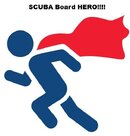About "Technical" diving
A large part of the problem to me is that we try to differentiate exactly what "technical" is in the first place! We are visiting an entirely foreign place, using equipment that requires training and education to use, that if mis-used can kill you! (not to be alarmist or anything...) So just like it has been said that every dive is a decompression dive, I would argue that every dive is also a technical dive! The question then becomes "What level or type of technical?" Is that how folks use the term? No. So to be understood by others I generally define a "technical dive" as any dive that involves an overhead (other than the swimthrough/light wreck penetration), be it virtual as in mandatory deco, or hard as in cave/wreck. I define a "technical diver" as a properly educated (not just trained, Educated) diver that is capable of properly planning and executing all aspects of a dive required to successfully and safely complete a dive that crosses that line into those overhead environments. Those two definitions seem to be generally agreed upon. Where it gets sticky is where you begin to add unusual amounts of complexity and task loading that can make an otherwise safe dive, unsafe (if one is inadequately educated of course). Rebreather diving is certainly one that gets pretty dangerous, pretty fast, even when mandatory decompression is not involved. To a somewhat lesser extent I feel the same way about adding stage bottles. One... I'm willing to call it a pony and let you call it "recreational". Two is pushing it. It is simply more technical than most divers are capable of handling safely unless they have been properly educated by whatever means necessary. Formal training is certainly not the only way to learn, and in fact the finest sidemount divers I've seen have been self/buddy educated, and the worst I've seen were the ones who took a class! A skilled sidemount diver is a beautiful thing to see. An unskilled, uneducated sidemount diver... is a mess. A plougher of coral, and general line trap, a general hazard!
There is no denying that the line between "recreational" and "technical" diving is awful thin and blurry these days. The use of "technical" equipment seems to be on the rise, and the cost of entry has come down. A Shearwater Petrel, a premier full decompression and mixed gas dive computer, can be had for just a little more than a Suunto D4i. It's pretty easy to push right into deco on a single tank with the rationalization that "it's just a few minutes, I'll be fine". Merely using such a device, or other "technical" doo-dads certainly does not make you a technical diver, even though you may have wandered into technical territory for a few minutes and survived.
I don't really have a solid point here, just getting some of my own thoughts out. From darned near day one of my diving experience I went with bp/w and long hose. By dive 32 I had taken and passed GUE-F, and have used doubles almost exclusively since then. (mostly because most of my dives are shore dives, and I'd rather gear up once for one long dive than do two shorter dives) Would I call that "technical diving"? No. Is it a little more complex than most of your run of the mill recreational setups, sure. I feel the same way about sidemount. Doubles/sidemount are certainly gateway drugs to the "technical" realm though. "Mmmm! Delicious oxygen! I needs more precious!" Yes, I'm a nerd... I've come to accept that...
Honestly, getting into the nuts and bolts, talking semantics and whatnot is much easier done in person over a hot meal and a cold beverage. There are just too many ways to be misunderstood in print to really come to any sort of agreement... Although I do think that as we move forward we are going to have to re-define how we think about technical diving. The conversation is probably important enough to be worth having even if there are a few misunderstandings along the way.





